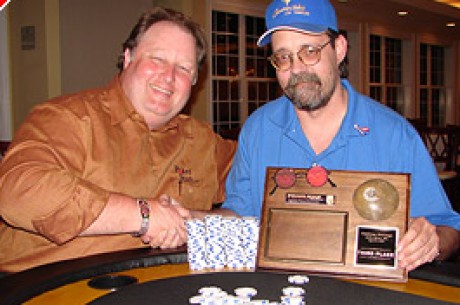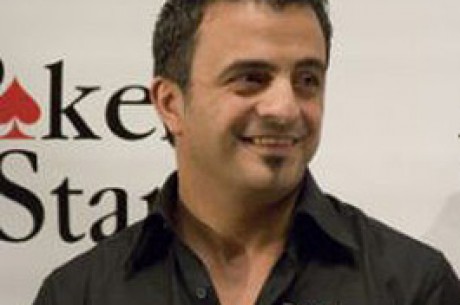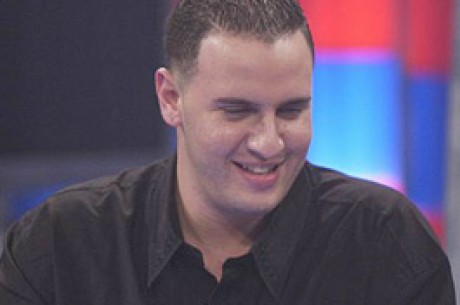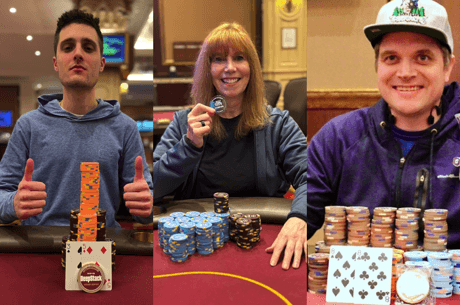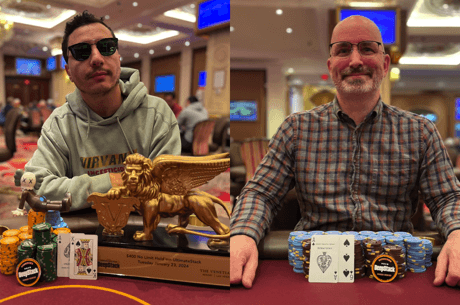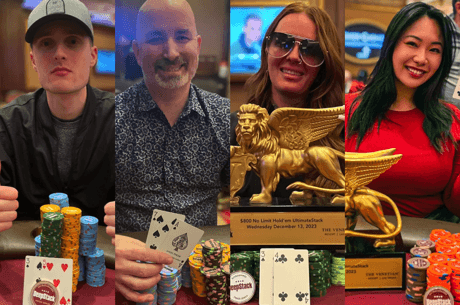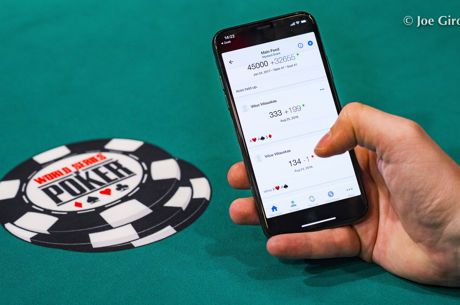Fossilman Poker Challenge In North Carolina, Part Two
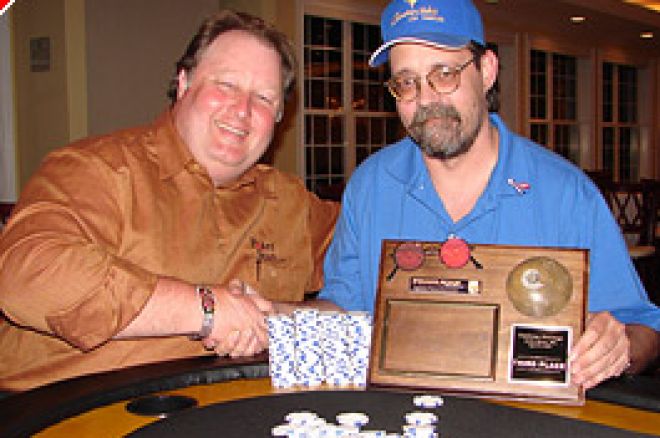
Sunday's Fossilman Challenge at the Little River Golf Resort and Spa in North Carolina was the first opportunity many had to play live poker in some time. For myself, it was an opportunity to end a personal streak of poor performances that had plagued my game lately. Whether it was the highly beneficial information provided during Greg's speech, a quality field or my personal drive to play my best game, it turned out to be a good way to spend a Sunday.
The Fossilman Challenge was a day-long event sponsored by the World Tavern Poker Tour. Raymer, as the namesake of the seminar, spent the entire day with over 100 players, entertaining them before, during and after the tournament with stories from the poker world and educating many towards improving their play. For over twelve hours, the inexhaustible "Fossilman" spoke to every person in attendance and truly made every player feel as if they were the star of the show, rather than the other way around. He exemplified class and showed why he is considered one of the great poker ambassadors in the game today as well.
As the tournament started, Greg roamed around the various tables, even stopping play at certain points to examine the players as to why they made particular plays. In some cases, he handed out "citations" to some players as reminders of why their actions were good or bad, signed and dated by the World Champion himself. It made the competition among the players quite serious as they attempted to make it to the final table, where Raymer would join them and compete as well.
When he came to my table during his tour of the room, he watched a very interesting hands between two of my tablemates. On a flop of 2-6-8, the big blind checked to the original raiser, who placed a 1,000 bet in the pot. He was quickly check-raised to 3,000 by the big blind, sending him into the tank. The raiser called the bet and, after a ten on turn (followed by two checks) and a river King (which the big blind bet, only to be called by the original raiser), turned up a suited J-10 against the big blind's pocket fours to take the pot.
"Let's break this hand down," Greg stated as action came to a stop. "I don't mind your original raise pre-flop and the bet on the flop, but why did you call him? What were your thoughts?" The gentleman, perhaps demonstrating some indecision on his own as to how he played his hand, hemmed a little before finally settling on he felt the big blind was weak. "Interesting," Greg replied. "A check raise is a strong indicator that one, he has hit a big hand and two, that he can beat whatever your holding. I don't like the call, but it worked out for you as the ten came on the turn, giving you the best hand." He then turned to the vanquished player and said, "I loved the check raise on the flop. You really forced him to make a decision at that time. I didn't like your river bet, as it was more than likely that one of or both the turn and river cards could have helped him. I would have liked to have seen you bet the turn, at which time you could have learned that he had hit his card and you could have gotten away from your hand." As the players nodded, he wrote up their pointers on the specially prepared "citations" and issued them to the two as well.
My own tournament was a demonstration of patience if not rapid chip accumulation. I started out with a rather silly move in which I had put my opponent on a draw, only to learn that he had hit the flop with his K-J and had me covered the entire way against my weak Jack pair. I was able to stave off elimination when my Big Slick went up against an A-J and, after a disappointing flop of 6-A-J, saw a Queen come on the turn and my salvation in a King on the river. The double up propelled me further in the tournament and I was able to make some more ground as the tournament continued.
As we approached the final table, I ran into one of the players that you will encounter in a tournament. His basic move was to push all in pre-flop, forcing his opponents into less than desirable positions as a caller. As he was the table chip leader (at the time), many didn't want to risk their tournament lives on the chance that he could be bluffing. At one point on the button I held a suited 9-8 and from UTG he made his all-in move. While I had a feeling that he was pushing an edge, I couldn't call with such a drawing hand against him. I reluctantly released the hand and he showed his to the table, a similarly suited Q-J. What could have been the end of my game instead prolonged it.
I eliminated a player soon after when I found one of my "danger hands" that has been destroying whatever success I had in tournaments for a bit. Under the gun I looked at a pocket pair of deuces and raised the pot (a highly risky move at anytime). I was reraised all-in from the small blind and, getting the odds, called his bet. He turned up a suited A-K as Greg watched the action.
I nodded as he said, "At that point, you had to call him," and the door card for the flop gave him his King. As I was only about a 10% chance to catch one of my two remaining outs, I was ready to end my tournament when another deuce came on the river to rescue my hand. As the crowd reacted, someone piped, "Wow, what a bad beat." Raymer quickly corrected him, saying, "No, that wasn't a bad beat. When the money went in the pot, he (indicating me) was a very slight leader. Although the King came on the flop and he redrew into the set, he still had the edge when the hands were shown. Thus, no bad beat."
With that win I was able to reach the final table, which held its own share of formidable players. Greg joined the final table with a chip stack aggregated to the average chip stack at the table. At the final table were the 2004 World Tavern Poker Tour National Champion Douglas "Moose" Jones and Bill "The Rake" Smith from Durham, Randy Johnson, Jr. and Ana Santiago from Wilmington, Scott Garfield and Deandra Gregory from Cary, Derek Scott from Morrisville, Ron Melson from Raleigh, myself and Greg Raymer, all North Carolinians.
I felt I had played very well up to this point, but was unsure of just how long I was going to last. I had slightly above the average stack at the table and the structure and blinds made the action fast. In fact, both WTPT champ "Moose" and then Greg Raymer were eliminated on simultaneous hands with their stacks devastated by the blinds and the attacks of their opponents. I stayed on course as the field began to thin.
When we reached four handed, I finally found a way to stump the World Champion. I had three quarters of my stack in the big blind and the button moved all-in. To my surprise, the small blind (who had a larger stack) called his bet. Here I was faced with a decision. As the final three places offered the best prizes, did I want to risk my random hand (I hadn't looked yet) all in and potentially finish out of the "money" in this case? I considered my options as I peered at a 9-2 off suit and reluctantly tossed them away.
Greg seemed surprised as he asked to get my cards from the muck as the hand continued. The small blind eliminated the button player for fourth place as he looked at my hand. With a huge sigh, he stated to the table, "I'd love to be able to say what I would have done in Earl's position, but I really couldn't. If he pushes the rest of his stack in, he runs the potential of nearly quadrupling his stack and has a shot at maybe working himself into playing for the win. If he folds, he accepts the fact that he will take either fourth place or, as one player was eliminated, he will take third. I really couldn't say which option I would have gone for."
As the case may be, I was going to go in third. My two competitors remaining both had very healthy chip stacks and it would take many double ups for me to regain any viability for winning the event. I was able to work a third place out of the event and end a particularly bad run for myself at the same time. It was well worth the Sunday spent to learn new poker tricks from Greg and the people at the WTPT definitely put their best foot forward in the presentation of the event.
Ron Melson was able to defeat Ana Santiago heads up to take the largest prize of the "Fossilman Challenge" and everyone remaining hung out for nearly an hour after everything was over to simply talk about the exciting day of events. Mike Matsinger, the founder of the World Tavern Poker Tour, was beaming as he discussed the success of the first event and the potential for future events. "If we can get Greg to do this again, it would be fantastic. We're looking at potentially having similar Challenges in either Maryland or Pennsylvania, but North Carolina has definitely shown they are behind the "Fossilman"!" For more details on the World Tavern Poker Tour and to see if your locale offers their events, be sure to visit their website at worldtavernpoker.com.
Ed Note: Look at all the stuff Greg learned by playing at Poker Stars. Why haven't you signed up yet?

